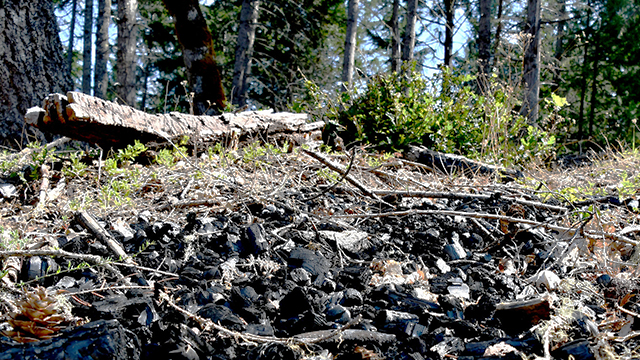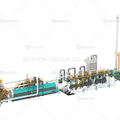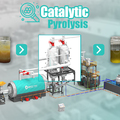Forestry waste, including branches, leaves, and sawdust, is often left to decompose or burned in open pits, leading to various environmental challenges. These include air pollution, soil degradation, and the loss of potential resources. However, a sustainable and profitable solution exists in the form of charcoal production. By using a wood charcoal making machine, forestry waste can be transformed into valuable charcoal, offering both environmental and economic benefits.
The Charcoal Production Process
Charcoal is produced through a process known as pyrolysis, where organic material, such as wood, is heated in the absence of oxygen. This process breaks down the biomass, converting it into charcoal, a solid carbon-rich material. The wood charcoal making machine is designed to facilitate this transformation by providing a controlled environment where heat is applied to the waste biomass, typically at temperatures between 400°C and 700°C.
As the biomass decomposes, volatile gases are released, leaving behind the solid carbon material that we recognize as charcoal. This byproduct, which is rich in carbon, can be used for various industrial and energy applications, making it a valuable resource. The remaining gases and oils can also be captured for use as fuel, enhancing the overall efficiency of the process and further contributing to energy savings.

Environmental Benefits of Charcoal Production
Charcoal production from forestry waste offers several key environmental advantages. First, it provides a sustainable means of managing excess biomass, reducing the need for open burning, which contributes significantly to air pollution. When left to decay in landfills or burned inefficiently, forestry waste releases harmful gases such as carbon dioxide (CO2), methane (CH4), and volatile organic compounds (VOCs) into the atmosphere. These greenhouse gases contribute to global warming and climate change.
Through pyrolysis, these emissions are minimized. The process is highly controlled, and the volatile gases that would otherwise be released into the atmosphere are either captured for energy or processed further. This significantly reduces the carbon footprint of forestry waste management. Additionally, the carbon in the produced charcoal is sequestered, meaning that it remains in a solid form for an extended period, preventing it from re-entering the atmosphere as CO2.
Another key environmental benefit is the reduction in landfill use. Forestry waste is often disposed of in landfills, which takes up valuable space and contributes to soil and water contamination. By converting this waste into charcoal, its lifespan is extended, and its environmental impact is reduced.
Economic Viability and Profitability
Charcoal production is not only an environmentally friendly solution but also an economically viable one. The wood charcoal machine allows businesses and communities to turn forestry waste into a valuable product that can be sold or used as an energy source. Charcoal has a variety of applications, including use as a fuel in industrial processes, in residential cooking, and in agriculture, where it is used as biochar for soil improvement.
In many regions, the demand for charcoal is strong, and its sale can provide an additional revenue stream for forestry businesses, municipalities, and even waste management companies. The process also creates jobs in the production, maintenance, and distribution of charcoal, contributing to local economies.
Furthermore, the energy produced during the pyrolysis process, including gases and oils, can be utilized to power the wood charcoal making machine itself or be sold as additional fuel, further enhancing profitability. The ability to produce both charcoal and energy from the same waste material ensures that the operation remains financially sustainable over time.
Soil Health and Carbon Sequestration
Beyond its role as an industrial fuel, charcoal, particularly when used as biochar, can have positive effects on soil health. Biochar, a form of charcoal that is used specifically for agricultural purposes, has been shown to improve soil fertility by increasing water retention, enhancing nutrient availability, and promoting beneficial microbial activity. This makes it an ideal additive for agricultural soils, particularly in regions with poor or degraded soils.
In addition, the process of producing charcoal from forestry waste helps sequester carbon. Unlike burning or decomposition, where carbon is quickly released into the atmosphere, the carbon in charcoal remains locked in a stable form for hundreds or even thousands of years. By using forestry waste to produce charcoal, large amounts of carbon are removed from the atmosphere, effectively contributing to climate change mitigation efforts.
Conclusion
Using a wood charcoal making machine to convert forestry waste into charcoal provides a sustainable and profitable solution to the growing problem of biomass waste management. The process not only helps mitigate environmental issues such as pollution and soil degradation but also offers economic opportunities through the sale of charcoal and the energy generated during production. Additionally, the use of charcoal as biochar offers significant benefits for soil health and long-term carbon sequestration.
By adopting charcoal production technologies, industries, municipalities, and farmers can manage forestry waste efficiently, contribute to environmental conservation, and generate valuable resources, making it a win-win solution for both the economy and the planet.





